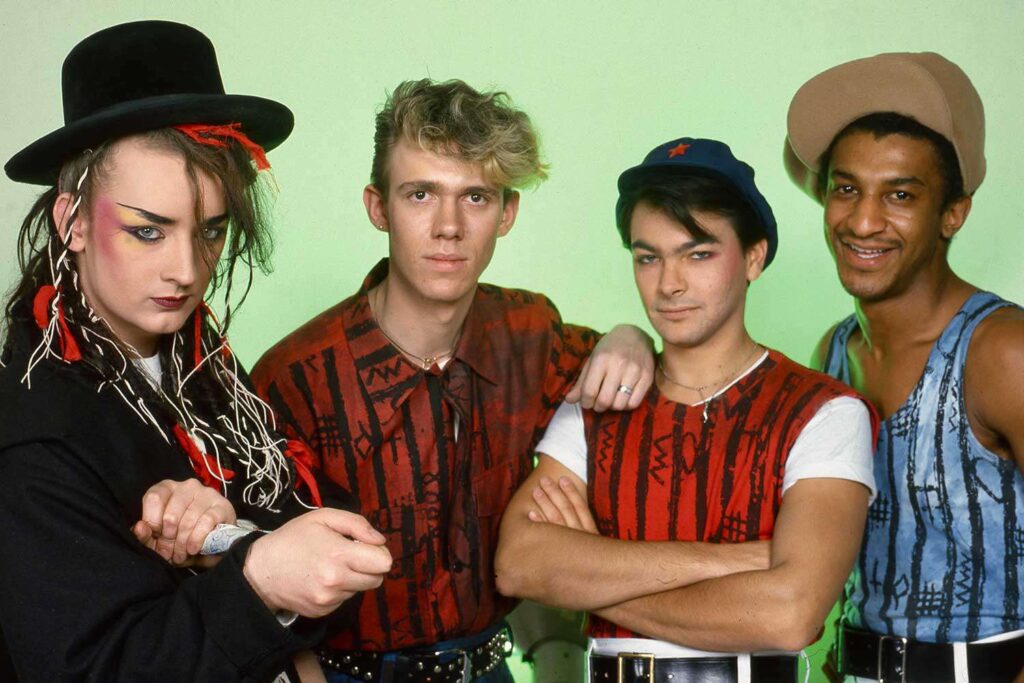NEED TO KNOW
Outside of “Do You Really Want to Hurt Me,” the legendary British pop group Culture Club’s signature song has to be “Karma Chameleon,” from 1983’s Colour by Numbers album. The catchy and bouncy pop song went to No. 1 on the Billboard Hot 100 chart and has since been a staple of Culture Club’s shows since the band returned to touring over 10 years ago.
But as guitarist Roy Hay says in the new documentary Boy George & Culture Club, which premiered at New York’s Tribeca Festival and will stream on Netflix this fall, he wasn’t initially keen on the song and thought it hurt the band’s credibility.
“We could have put out a fart in a bottle in [1983], it would’ve been No. 1, and that was it,” Hay, 63, told PEOPLE at the June 5 premiere. “No, I’m kidding. Here’s the thing: It’s become a very iconic song, and when we close our concerts with it, and having people singing it back, it’s amazing. But if you put it up against the rest of our catalog, it doesn’t stand up as a song. But it’s a great record.”
Culture Club/YouTube
Culture Club’s previous hits such as “Do You Really Want to Hurt Me,” “Time (Clock of the Heart)” and “I’ll Tumble 4 Ya” fell into the new wave and blue-eyed soul categories. “Karma Chameleon,” on the other hand, sounded more rockabilly and country. But singer Boy George, who wrote the lyrics and melody, had faith in it even while the other members Hay, bassist Mikey Craig and drummer Jon Moss disagreed.
“I sang it a cappella in Roy’s kitchen and had to fight with them to get it on the album,” George wrote in his 2023 memoir Karma, adding, “However much the boys hated ‘Karma,’ it was the last track added to the album almost over their dead bodies.”
Craig, 65, was more diplomatic about the song more than 40 years after its release, telling PEOPLE at the documentary premiere: “I guess I was playing Dr. [Henry] Kissinger in the band and trying to keep everybody together. I mean, I knew that if we didn’t do it, it would’ve upset George. So I said to Roy, ‘We’ve got to do it.’ And we made a bet that it was going to be a No. 1, and Roy lost.”
The story behind “Karma Chameleon” is one of the highlights of Boy George & Culture Club, expertly directed by Alison Ellwood. Told through new interviews with all four members, the film traces the band’s meteoric rise during the first half of the ‘80s propelled by George’s flamboyant look and persona. The intense fandom towards the group was reminiscent of Beatlemania, but they broke up following George’s drug addiction and arrest for heroin possession in 1986.
“I was a huge fan back in the day,” Ellwood told PEOPLE at the premiere. “So what was really wonderful was rediscovering how the depth and sophistication of their catalog is beyond the big hits. There’s a lot of really beautiful music, and George’s voice of course is astounding. They were really talented musicians and sophisticated and blending all these different kinds of things and nothing else sounds like them.”
“Over the years we’ve done some real tragedies,” Hay says of the previous documentaries about Culture Club. “Behind the Music was awful. We did a horrible thing with a friend of George’s called Karma to Calamity. Finally, there’s an actual documentary with a quality filmmaker, Alison. There’s a real good representation of the band, and I’m very excited about it.”
Before they made it big, Culture Club was a unified group in the early years. But as told in the documentary, the dynamic within the band changed after their performance of “Do You Really Want to Hurt Me” on the British music television show Top of the Pops in 1982. The media lavished its attention on George and basically ignored the other three band members.
“It was a really interesting moment because it had been a representation of the four of us,” Hay says, “and I think it changed everything from the way Virgin [Records] went with the album cover [1982’s Kissing to Be Clever, which featured only George] to everything at that moment…. It was kind of a natural reaction when I think about it in retrospect. But we were all sort of stunned. ‘What just happened?’ It is the greatest moment in your career. You’re like, ‘Oh, okay.’ ”
A considerable portion of the Culture Club story was the romance between George and Moss, which started out almost like a fairy tale and then became volatile as the group became famous.
“Their music is about their love,” Ellwood says. “All the lyrics are written about Jon, and so all their music is about their love story and they defied the odds and they kept it secret for a while, and then people found out. And with the backlash against the LGBTQ+ community right now, it’s more important than ever to show the strength of love.”
Dia Dipasupil/Getty for Tribeca Festival
Another moment told in the film concerned the uproar following George’s remark on the 1984 Grammy Awards telecast when, after Culture Club won Best New Artist, he said, “Thank you, America. You’ve got taste, style and you know a good drag queen when you see one.” It led to intense media attention and public scrutiny over George’s sexuality.
“I didn’t realize it would become the moment that it did become — quite a big soundbite, really — over the years,” Hay says. “It was just George being George to us. And it was funny. I remember I laughed quite hysterically.”
“I mean, it was one of George’s soundbites,” adds Craig. ”In those days, he used to say he preferred a cup of tea to sex. And that followed him everywhere as well.”
A poignant moment in Boy George & Culture Club covers the band’s absence at the 1985 charity concert event Live Aid, which became a sore spot for Craig. “That put me in a tailspin because I don’t know, just as a humanitarian, I felt I wanted to do something, [and] play my part in helping a part of the world, a part of society. So that was very, very hard.”
“To be fair to George, he wasn’t in a good place at the time,” he adds. “I should realize that. I accept that. He wasn’t in a good place, and it [Live Aid] panned out the way it did. But it broke me in two. I mean, I was practically in tears.”
Martin Philbey/WireImage
It was around the time of Live Aid that George became addicted to drugs, later leading to his arrest and the band’s hiatus. “We discovered that he was using and everything had to stop then,” Craig says. “It was a pretty sad time. Difficult time. Very difficult time.”
Culture Club has had periodic reunions over the years, and since reforming in 2011, they’ve continued to tour and record steadily, minus Moss, who stopped touring with the band in 2018 and left entirely in 2021. “I’m so happy Jon came and did [the documentary],” says Hay. “We all harassed him. We said, ‘It’s part of your legacy. You’ve got to come and do this.’ So we’re very happy with it.”
Never miss a story — sign up for PEOPLE’s free daily newsletter to stay up-to-date on the best of what PEOPLE has to offer, from celebrity news to compelling human interest stories.
Craig reveals that the band is preparing new Culture Club music to follow up 2018’s Life album. “It’s always great,” he says. “Performing live is the best part about being in a band. All of the politics and bulls— that goes on outside of it, you can all leave behind. But once you step on the stage, it’s fine. You’re young again for two hours and it’s brilliant.”
“Also, we’ve been recording recently,” he continues. “We have a new version of ‘Do You Really Want To Hurt Me?’ A deconstructed modern version of it. And there’s some guest artists on the song as well. So it’s going to be fantastic.”

